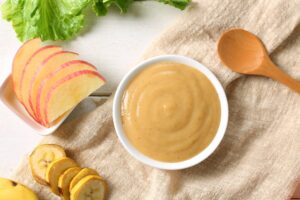Top Questions Parents Ask About Baby Diet Plan
- Published on:
- Last update: 09 October 2023

When is the best time to start solid food for a baby?
A baby diet plan for Approximately the first 6 months should be spent exclusively breastfeeding. It means you do not need anything other than breastmilk during the first six months of a baby’s life. It is not necessary to provide water to breastfeed because breast milk contains 80% water.
Due to medical or personal conditions, if you wish to wean after 4 months of the baby, please speak with your Pediatrician and, if agreed, here are some suggestions for weaning a 4 to 6-month-old baby. After 6 months of exclusively breastfeeding, I started feeding my babies solid foods according to my baby diet plan.
Could we introduce a new food every day?
The pediatrician recommended that I introduce one new food a day before 12 PM in the first part of the day. In recent years, studies have found that the practice of offering the same food for two to three days to determine allergies is no longer necessary in babies aged 6+ months. Studies have found that babies aged 6+ months should be offered new food every day instead. Consider the possibility of allergy-triggering food in the baby diet plan.
According to the latest guidelines, parents should introduce allergy-prone foods such as citrus fruits, nuts, wheat, eggs, fish, berries, melons, and brinjal as soon as possible between 6 and 8 months to prevent allergies or reduce the impact of allergies, if any. Please consult with your Pediatrician about these points for more information.

Is it best to skip breastfeeding in order to introduce solids?
Solid foods should not be given to babies under 1 year of age if breastfeeding has been interrupted. After breastfeeding, as usual, solid foods can be introduced later. After nursing, it is recommended that you feed solids at least 30 minutes to an hour after breastfeeding, based upon the baby’s appetite, baby diet plan, and mood.
If your baby is overly hungry or drowsy, you should delay solid feeding. Instead, wait until the baby expresses happiness. The first half of the day is the time to introduce new foods so that any allergies can be noted and treated. Continue breastfeeding before every meal until the baby turns one. Following one year, you should breastfeed a total of five to six times a day according to the baby’s demands and baby diet plan.
How many meals does a baby need a day?
In addition, too much solid food can cause constipation in babies if given 2 to 3 times a day. The breastmilk provides the baby’s major source of nutrition until he is 1 year old. Adding solid foods to the baby diet plan is just complementary in order to meet their additional dietary requirements.
I supplement their diet by adding one meal per month. The baby gets more breastmilk and does not suffer any constipation. However, some doctors suggest beginning with more meals per day to prevent constipation. That’s up to you. Listed below are my recommendations according to my baby diet plan.
- Having completed 6 months (180 days), I began to give one food each day at brunch time on the 7th month (running).
- My 8th (running) month of eating has added one more meal after completing 7 months (210 days). Breakfast and late lunch have been added.
- I completed 8 months of running in 240 days, adding one meal in the 9th month (running). It included breakfast, lunch, and dinner every day.
- Then, on the 10th month (running), I added a snack after completing 9 months of training (270 days). During this period, I provided breakfast, lunch, an evening snack, and dinner.
- You should add something to your breakfast on the 11th month (running), after you have completed 10 months (310 days). I didn’t include the snack time for the morning because my baby was napping by then, so I was not able to fit it in.
- In addition to 3 meals and 2 snacks, after 11 months (340 days), the baby will have 3 meals and 2 snacks in the 12th month (182 days).
How much water is required for a baby?
Post-meal, two to three sips of water are enough if you are breastfeeding on demand. Our food supply will increase as we feed water after every meal as we increase the number of meals per month. There is no need to add more water as it will fill the baby’s tummy with the liquid. Your pediatrician should determine the amount of water to give formula-fed babies. Please do not give water in bottles or sippers.
Give water with a spoon or in a small cup instead. I give my baby water in a small silver tumbler. When my baby first spits out the water, I give him more. You don’t have to worry about it. They will get used to it eventually. It is not advisable to feed water in between meals, because it will interfere with the digestion process. Sips of water should be given after meals.

Is it safe to give my baby juice or soup?
Watery foods or soups or juices are not recommended for babies under a year old as they fill their tummies instead of breastmilk and offer less nutrition. Additionally, watery porridges or purees should also not be consumed. Because babies eat very little, offering thick, healthy foods with dense nutrition makes sense. Stick to a safe and nutrient-rich baby diet plan.
What is the right amount of food to feed a baby?
A new mom’s most commonly asked question. It’s up to the baby to decide the quantity. Prepare only a small quantity. Initially, the baby might eat just 1 or 2 teaspoons and gradually might increase to 1 or 2 tablespoons. Adjust the quantity in the baby diet plan according to the baby’s appetite.
When the baby finishes the whole bowl, next time slightly increase the quantity that you prepare for the baby. It is not recommended to force a baby to eat food. If the baby shows signs of “NO” like turning their head away from the food, zipping up their mouth, spitting continuously, or crying, stop feeding them.
There are some days where the baby does well and some days when the baby doesn’t eat at all. That’s okay. There’s no need to force it. You shouldn’t force a cranky baby to eat. In order to make up for a meal she hasn’t eaten well, she drinks more breastmilk. Whenever possible, I offer her a favorite dish during the next meal. It’s not a good idea to serve alternates at the same meal since it will encourage selective eating!
Are there any foods that help babies gain weight?
- Avocado, potato, sweet potato.
- Cooked Nendhran banana
- Curd rice & yogurt smoothies
- Sprouted Ragi porridge
- Sago + urad porridge
- Rice: mix it with fruit & vegetable purees
- Ghee: Add melted ghee to food offered in the daytime.
- Include moong dal at least once a week
Should I give iron-rich food to my baby?
Yes. For foods rich in Iron like Spinach, Beetroot, Peas, Sweet potato, Eggs, Poha, Rice, Meats, Lentils & Legumes, either add a few drops start with 3, and gradually increase it to 10 drops before feeding or mix a few drops in water that will be given after meal or just give a piece of orange or any other vitamin-C rich fruit.
Citrus fruits, Berries, Kiwi, Papaya, or if possible add vitamin-C rich veggies Tomato, Cauliflower, Broccoli, Potato, Capsicum, Cabbage, Brussel sprouts while making that food.
Iron is better absorbed by the body when vitamin C is present. If your child receives iron-rich foods, the calcium in the milk and milk products (like paneer, curd) inhibits their absorption of iron. Unlike milk, ghee is calcium-free, so it can be eaten with foods high in iron.
Asking Questions is Good
Having questions about the baby diet plan is good. It helps clear our minds and prevents unnecessary problems. Make sure that you get answers from verified and valid sources. Look out for baby food allergies and take precautions if there is a family history of any allergies. Please consult a pediatrician if you plan to make any changes to your baby’s diet or you have any further questions. Keep in mind that it is normal to have questions especially when it comes to baby foods. Getting advice from trusted sources will help you get the best results.
Share this post:

